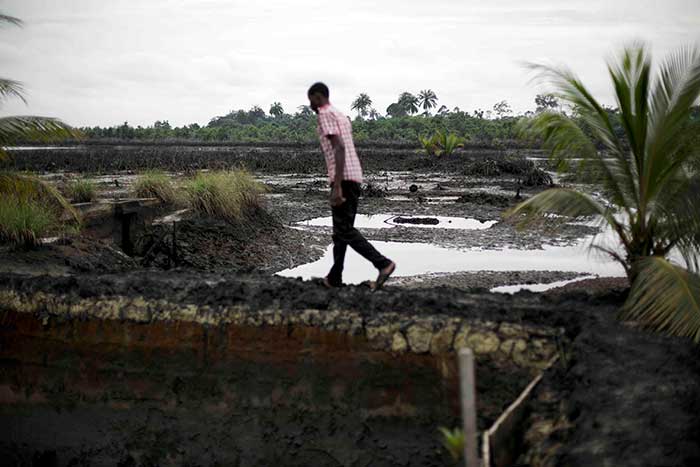web_ogoniland_22707273700_3c416c8537_o.jpg

Oil pollution in Ogoniland. Credit: Luka Tomac/Friends of the Earth International
Nigeria’s vice president Yemi Osinbajo announced today that the financial and legislative frameworks are finally in place to make good on one what was one of Nigerian president Mohammadu Buhari’s key election promises.
Since oil extraction began in Ogoniland, which was for many years the centre of the Nigerian oil industry, decades successive spills by Shell, Nigeria’s national oil firm and others have led to environmental catastrophe in the region.
In 2011, the United Nations Environment Programme, which helped to design the clean-up operation, found evidence of “severe and widespread” soil and ground water contamination, which spread into communities’ drinking water and exposed the public to dangerous chemicals and carcinogens and “utterly devastating” vital and rich ecosystems like mangroves.
It noted that the controls put in place by both government and the oil industry had been inadequate. Today, Ogoniland is one of the most oil polluted regions.
Achim Steiner, UNEP executive director, said the people of Ogoniland have “paid a high price for the success of Nigeria’s oil industry”, enduring a toxic and polluted environment for too long.
The operation will include: building a factory to clean tens of thousands of tonnes of soil, creating hundreds of jobs for local people; mass mangrove replanting; creating a body to oversee the restoratio; setting up a centre of excellence to promote learning and regulation; monitoring and enforcement reforms; and improving practices in the oil industry.
The UNEP’s 2011 report estimated that contaminated land areas in Ogoniland could be cleaned up within five years, but heavily affected mangrove and swamplands could take as long as 30 years to restore.
“A clean-up and restoration effort like this cannot happen overnight,” said Steiner, “But I am hopeful that the cooperation between the government, oil companies and communities will result in an environmental restoration that benefits both ecosystems and the Ogoni people.”













